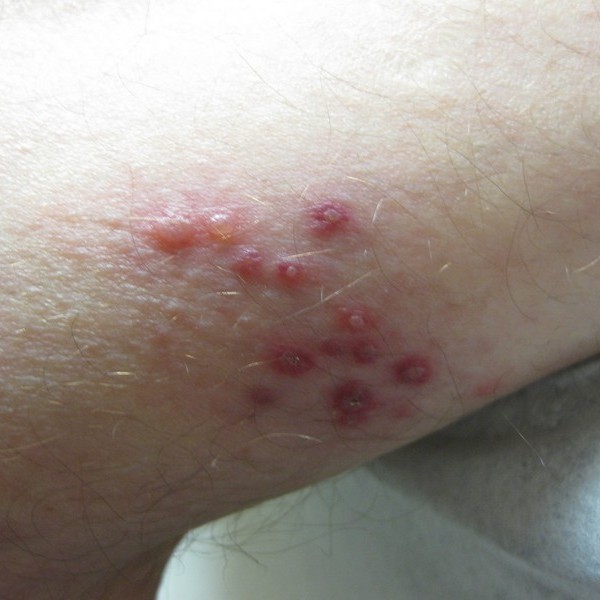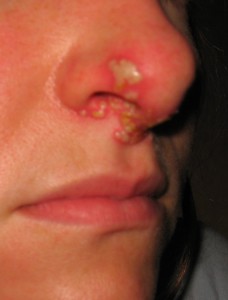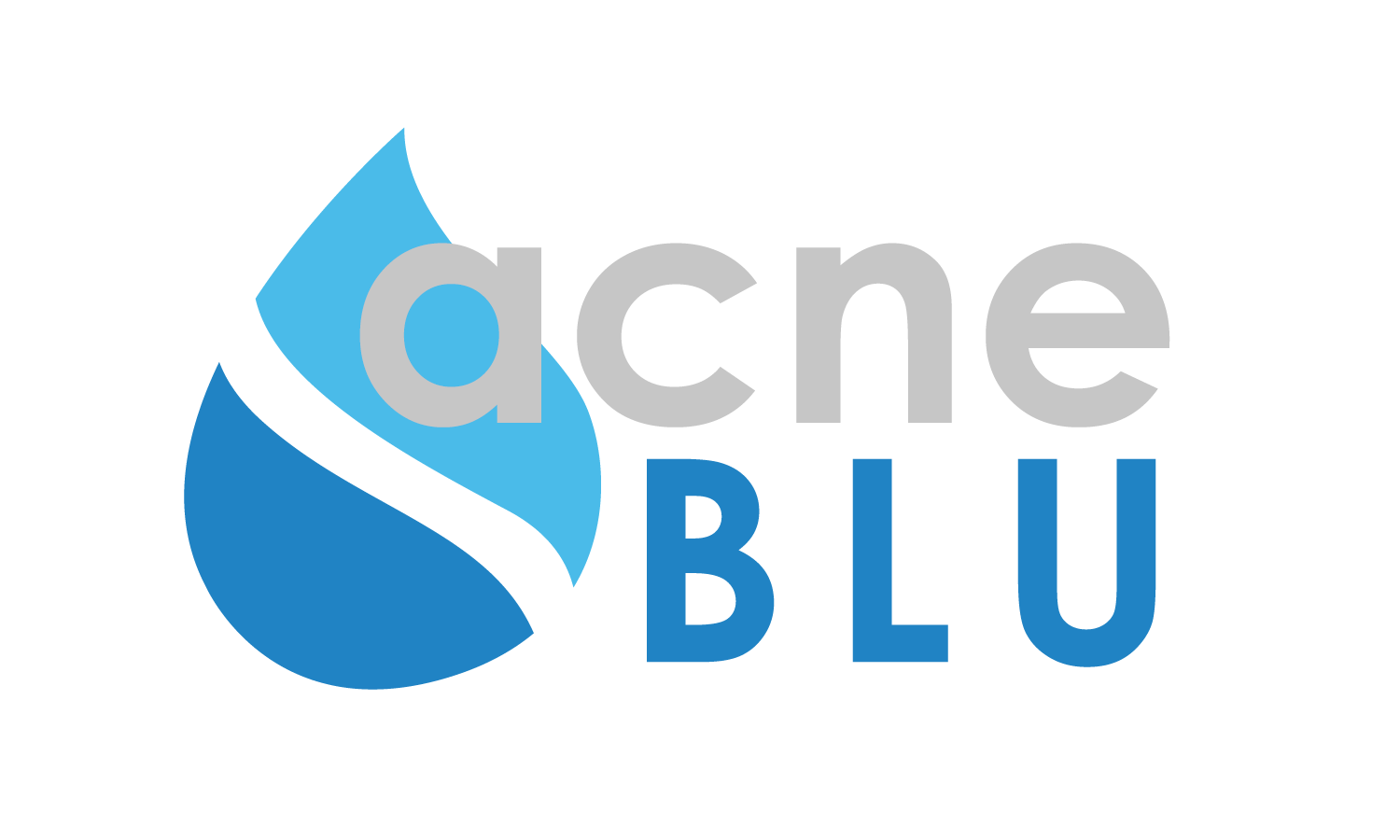2024/07/27 printed from http://dermboard.org All Rights Reserved

What is herpes simplex infection (cold sore and genital herpes)?
Herpes in Greek means to creep (like a serpent), which somewhat describes appearance of the herpes simplex outbreak – clusters of small vesicles and crusty bumps forming serpent-like pattern on the skin. Two types of viruses, Herpes Simplex Virus 1 (HSV-1), and Herpes Simplex Virus 2 (HSV-2) cause it. Â HSV-1 usually causes breakouts near the mouth and inside the mouth, while HSV-2 usually causes breakouts on genitalia, where it is called genital herpes.
How does herpes simplex look and feel?
 If you get the breakout for the first time it is usually very painful and exuberant, sometimes associated with flu-like symptoms. It is in the form of painful small blisters that break open and become crusty around mouth, nose, or inside mouth, or on genitalia. Initial episode usually lasts up to 14 days, then the virus retracts in the surrounding nerve endings. It stays there “sleeping” until your immunity gets weakened for whatever reason (stress, some other illness, or injury etc.) when you get recurrent outbreaks. These recurrent outbreaks of painful blisters and sores are milder and last shorter (up to 8 days). Often, before the next outbreak, you can feel tingling, mild burning, or pain in the area of the coming outbreak.

How did I get infected?
Herpes simplex virus is spreading from person to person by a direct contact (kissing, touching, sex), and indirectly by sharing various objects such as spoons, forks, glasses, towels, lipsticks, or by sharing sandwiches, ice-cream, drinks etc.
When should I see my health care provider?
It is always wise to see your health care provider for an initial exam, and for a correct diagnosis, and to exclude something more serious, especially if it is on your genitalia.
Is there a test for herpes infection?
There is no over-the-counter do-it-yourself test as of yet, but your health care provider may swab the sore to send it to a lab to check for herpes simplex virus. Rarely, we do blood test to check for antibodies against the virus, which tell us that infection has occurred sometime in the past. In many cases no testing is needed, just good exam and good story from you will be enough to come to a correct diagnosis.
What is the treatment for herpes infection?
There is no cure for herpes as of yet, but oral pills called antivirals such as acyclovir (brand name: Zovirax), valacyclovir (brand name: Valtrex), and famciclovir (brand name: Famvir) can be used in more severe cases. These pills can shorten the duration and lessen the severity of the outbreak if started very early after its onset. Â Pain pills such as ibuprofen (brand names: Advil and Motrin) or acetaminophen (brand name: Tylenol) can also be added. In the majority of cases no treatment is necessary. Â Since there is no cure (i.e. once you get the infection you will have it for the rest of your life), outbreaks can occur from time to time. If you have outbreaks very often (about once monthly) then your health care provider may prescribe you with an oral antiviral pill that you take daily to prevent outbreaks.
How can I prevent outbreaks and prevent infecting others?
There is no vaccine for herpes simplex as of yet, but you can use general precautions such as avoiding a direct contact with infected person such as kissing, touching, sexual intercourse without condom, and by not sharing various objects such as spoons, forks, glasses, towels, lipsticks, or by not sharing sandwiches, ice-creams, drinks etc. If you have outbreaks very often (about once monthly), then your health care provider may prescribe you with an oral antiviral pill that you take daily to prevent outbreaks. You should also inform your sexual partner about your herpes infection, as well as to ask your sexual partner to disclose her or his health situation. Bear in mind that you can get infected or infect others even without visible outbreak. Also, currently about 16% of US population is infected with genital herpes, many of which do not even know that they have it.

My right nostril is swollen and sore. Do I have a cold sore on it?
Am so happy to tell about Dr sikies , i contacted him regarding the solution to Genital Herpes and he sent me a herbal that worked perfectly well. I have waited for two years for proper observation and i am still OKAY (Herpes Negative). Dr sikies is God sent, Dr sikies has herbal solution to all health issue includine Hiv, Cancer, A L S, MS, Hepatitis A, B, C, and E viruses, Machupo virus, Liver disease, Stroke, Coronary Heart Disease,HPV , etc. Contact him with via email address [email protected] WhatsApp: +2348163430143
Placed order now via website : https://drsikiesherbalcuremedicine.weebly.com/
Facebook page https://www.facebook.com/doctorsikiesherbs
You can reach me via email : [email protected]
I was diagnosed of HERPES Virus in 2016 and I have tried all I can to get cured but all to no avail, until i saw a post in a health forum about a herbalist man who prepare herbal medication to cure all kind of diseases including HERPES virus, at first i doubted if it was real but decided to give it a try , when i contact this herbalist via his email and he prepared a HERPES herbal cure and sent it to me via UPS delivery company service, when i received this herbal cure, he gave me step by directions on how to apply it, when i applied it as instructed, i was totally cured of this deadly disease within 14days of usage, I am now free from the deadly disease called herpes, all thanks to Dr Akhimien you can rich this great herbal doctor via his email: ([email protected])call or Whatsapp him on his mobile number +2349133157031He also have the herb to cure:(1)I WANT MY EX BACK(2) DIABETES,(3) HIV&AIDS,(4) LUPUS,(5) CANCER,(6) HERPEShttps://www.facebook.com/Drakhiniem/